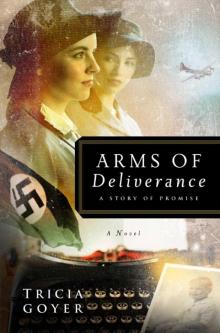- Home
- Tricia N. Goyer
Arms of Deliverance
Arms of Deliverance Read online
Arms of Deliverance is a compelling novel giving the reader an accurate portrayal of the anxieties and threats facing the airmen in the war against Nazi Germany. As a co-pilot who parachuted from a burning B-17 and witnessed the mayhem in the sky over Berlin, I found this novel both gripping and exciting.
—Glenn Howard Hale,
former 2nd. Lt., 390th Bomb Group, 8th Air Force.
MIA 2Mar45 on Dresden raid, parachuting into Poland
It was a fascinating pleasure to watch the development of the author’s courageous young reporter. The description of airbase activities and flight in a B-17 bomber out of Bassingbourn, England brought back poignant memories of my personal wartime experiences. I too flew with the 91st Bomb Group out of Bassingbourn as a Pathfinder Navigator. The descriptions of flight conditions are thought-provoking and accurate. Further, the author has pieced together an intriguing story with different segments. She skillfully guides the reader through peaks and valleys of why we fought, the struggle to win, nail-biting suspense, divine guidance, and … sweet victory. Tricia Goyer has effectively captured the robust ‘Can Do’ spirit of World War II.
—John Howland, Pathfinder Navigator,
91st Bomb Group
I found the book by Tricia Goyer brought back a lot of memories of WW2. It was very interesting how she wove the story around all the characters. Also, her research adds to the authenticity of the characters and times and places involved.
—Jack Gaffney,
91st Bomb Group
As a veteran of the 8th Army Air Corp and the 91st Bomb Group, 401st Squadron, years 1943 and 1944 completing my tour of 31 missions by mid 1944, I can appreciate the preparation Mrs. Goyer attained to get the details so accurate that she brought back the vivid details of each incident she included in portraying the actual flight experiences of the crew and positions of responsibility during the heat of battle.
—George Parrish,
8th Army Air Corp and 91st Bomb Group
War-weary WWII Europe sets the stage for Arms of Deliverance, a powerful novel that weaves the lives of ordinary men and women who become extraordinary heroes. Their stories grip the heart with the powerful emotions that only war can bring. Love and hate, life and death, and those misguided passions that could only know defeat. Between the pages, I was there. Lived it and felt the surge of freedom that only true sacrifice can bring.
—DiAnn Mills, bestselling author of
Leather and Lace and When the Lion Roars
Tricia Goyer’s Arms of Deliverance is a great read. Fast-paced, beautifully researched and touching, it brings the years of World War II to life.
—DeAnna Julie Dodson, author of
In Honor Bound, By Love Redeemed and To Grace Surrendered
A Novel
TRICIA
GOYER
MOODY PUBLISHERS
CHICAGO
© 2006 by
TRICIA GOYER
All rights reserved. No part of this book may be reproduced in any form without permission in writing from the publisher, except in the case of brief quotations embodied in critical articles or reviews.
Scripture quotations, unless otherwise noted, are taken from the King James Version. Scriptures marked NLT are taken from the Holy Bible, New Living Translation, copyright 1996. Used by permission of Tyndale House Publishers, Inc., Wheaton, Illinois 60189. All rights reserved.
Editor: LB Norton
Cover Design: LeVan Fisher Design
Cover Image: Steve Gardner, pixelworksstudio.net and istockphoto
Interior Design: Ragont Design
Library of Congress Cataloging-in-Publication Data
Goyer, Tricia.
Arms of deliverance : a story of promise / by Tricia Goyer.
p. cm.
ISBN-13: 978-0-8024-1556-1
ISBN-10: 0-8024-1556-3
1. Women journalists—Fiction. 2. Jewish women—Fiction. 3. World War, 1939-1945—Belgium—Fiction. 4. Eugenics—Germany—History—20th century—Fiction. I. Title.
PS3607.O94A89 2006
813’.6—dc22
2006008109
We hope you enjoy this book from Moody Publishers. Our goal is to provide high-quality, thought-provoking books and products that connect truth to your real needs and challenges. For more information on other books and products written and produced from a biblical perspective, go to www.moodypublishers.com or write to:
Moody Publishers
820 N. LaSalle Boulevard
Chicago, IL 60610
1 3 5 7 9 10 8 6 4 2
Printed in the United States of America
To Leslie Joy
Your care and compassion for others pales only to your
passion for God. I’m proud to be your mom.
“You guided my conception and formed me in the womb.
You clothed me with skin and flesh, and you knit
my bones and sinews together.
You gave me life and showed me your unfailing love.
My life was preserved by your care.”
Job 10:10–12 NLT
CHAPTER ONE
Katrine squared her shoulders and instinctively pressed a hand to her stomach as she stepped through the open doors of the café, past the yellow sign that read NO JEWS ALLOWED. She paused as the strong aroma of coffee and cigarette smoke hit her face. Men and women clustered around tables. Beautiful people in the height of their glory.
Looking around at the room’s flocked wallpaper, ornate light fixtures, and marble flooring, she found it hard to believe that not too far away a war stormed. Not only battles for land and power, but a war against a people—her people … or what used to be her people.
Tucked between France, Holland, and Germany, Belgium had fallen to Nazi control in 1940, four years earlier. Yet many acted as if the war were not more than a minor disturbance—especially the Germans who filled and controlled the streets, embracing the country as their own.
Katrine had come here too, to escape, to blend in with the numerous transplants on the Belgium streets. More than a year had passed since she was Rebecca Lodz. With the right connections and right papers, she’d hidden herself well. Perhaps too well.
She had visited this café and sipped coffee with her lover only the day before. Yet today she looked upon the scene differently. Now when she glanced at the other women with their fine clothes, red lips, and fancy hats, she realized what she’d become, and whom she’d betrayed. Heaviness burdened her chest the same way it had when she was hiding in that dark, smelly barn.
Only this time it wasn’t rotten potatoes that pressed upon her, animal fodder that for a time had protected her from death. Her burden now was shame—for she was to birth the child of a man who wouldn’t hesitate to kill her if he only knew the truth.
She sucked in a calming breath, wishing she’d called to cancel their meeting. But it was too late. Hendrick had spotted her and waved her toward the secluded table. Two glasses of red wine sat on the glass surface, one half empty. Katrine could tell from the foggy sheen of his gaze that this glass wasn’t his first.
“Sweetheart, you look beautiful tonight. That new dress brings out the blue in your eyes.” He took her face in his hands and pressed his lips against hers. There was possession in his kiss, and a hunger she had come to know well.
“Sit, we will eat, and then take a walk along the river. It’s beautiful this time of year, don’t you think?” His voice was deep and throaty, and Katrine knew what he wanted.
Although Hendrick Schwartz was an officer in Hitler’s army and a wealthy man with a fine furnished apartment, he was also an outdoor enthusiast like none Katrine had known. No doubt he had in mind finding a secluded corner of the park and laying her down in the so
ft spring grass to take what they both had come to understand was rightfully his.
Katrine stared across the table at her lover. Though twenty years her senior, Hendrick, with his tall, thin frame and chiseled features, turned the heads of many beautiful women. He’d caught her attention, after all.
They’d met one of the first times she’d dared venture out with her new identification papers. Though Katrine now lived a thousand miles away from the village of her birth, and though she looked as Aryan as the women highlighted on Hitler’s posters promoting racial purity, she wasn’t used to being out in the open.
After a year of hiding, she’d walked out of her home that afternoon still longing for the safety of darkness. “People can hide better in a crowd than in the safest dark hole,” said the resistance worker who’d come up with the plan to “Germanize” any Jews who looked the part.
Katrine was riding the tram to the market in Brussels when the handsome officer sat down beside her. She answered his questions bluntly. Yes, she was new to the city, having recently taken a job as a nanny. No, she hadn’t had time to see much of the Belgian capital. Yes, she did have Sunday afternoons off. Before she realized what was happening, she found herself agreeing to a picnic in Parc de Laeken the next Sunday afternoon.
When Katrine told her protector about the invitation from a German officer, the woman had been pleased. “If you can fool him, you’ll fool them all. No one would dare question the girlfriend of a dedicated SS man.”
Now, mere months later, she not only hated herself for falling in love with the handsome soldier, but for tying herself to him through this child—their child. She picked up her wine glass, swished it, then set it back down, her eyes focusing on the grouted lines of the tiled table.
Hendrick took her hand in his. “What is it, darling? Your favorite song is playing, and you didn’t even comment. Are you ill? We don’t have to go for a stroll tonight, after all. Perhaps we can return to my apartment, and I can rub your feet.” Hendrick winked at her. “I told you, you shouldn’t work so hard. Are the Pfizer children acting up again?”
“Hendrick, I’m pregnant.” The words escaped her lips, and Katrine lowered her head, unwilling to meet his gaze. She’d been meaning to wait. To find the right time, the right words. Although she hated what she was, Hendrick’s mistress, what scared her even more was the thought of being alone, forced to raise a child on the little income she made.
“Pregnant?” Hendrick rose and swept her into his arms. “Yes! A child. My child.” His voice rose and his laughter echoed in the room. He spun her around once and set her down gently in her chair. Then he lowered his face toward hers and placed a dozen soft kisses across her forehead, acting as if they were the only two people there.
“A child. My child!” he repeated, louder.
With trembling fingers, Katrine pushed back the stray curls that had escaped from her pinned-up hair. “You’re happy?” Her eyes searched his.
“Happy? I’m overjoyed. No, jubilant!”
“But what of your … wife?” Katrine mouthed the last word rather than speaking it aloud.
Hendrick laughed again and sat back down. “Oh, sweet Katrine, you think she does not know? I am with you nearly every day of the week. Our picnics, the gifts.” He took a long drink of wine. “Oh, my naïve girl, this is a new Germany. A land of innovative ideals. Haven’t you heard Himmler himself: ‘All women might not have the opportunity to become wives, but all should have the chance to become mothers.’ My darling, I’ve given you that chance. And you, my dear, will give me the son I long for.”
Mary Kelley sprinted down Sixth. The soles of her black-and-white saddle shoes barely touched the littered sidewalk as she wove through the crowd with the same urgency as when she was ten and Mr. Stein chased her, broom in hand, after she’d stolen a pack of gum from his corner grocery.
Only this time she was running to something, not away. For if she got the scoop today—the true story from the senator concerning the future of veterans’ benefits—then she’d really be going places. Away from her past as the illegitimate, big-dreaming daughter of a cleaning woman. Away from the gangly girl who’d lived her whole life dreaming of escape from the tight-knit German neighborhood in which the home country wasn’t simply missed, but rather revived in the New York streets with an abundance of sausage, beer, and song.
The dense crowd slowed Mary’s steps, and she noted that the entourage of black sedans had nearly made it to the corner. If she didn’t hurry, the senator would slip inside the hotel before Mary could get a chance to speak to her.
“Excuse me, sir. Pardon, ma’am.” Mary straightened her pleated black skirt and white blouse, then reached into her small satchel and pulled out two pink ribbons. She quickly parted her hair and formed two ponytails. Then she stuck a pencil behind her ear, clutched a composition notebook to her chest, and made her way through the mass of journalists already forming a semicircle at the end of the parade route. “Excuse me. May I squeeze in? Thanks so much.”
The crowd parted, body by body, until Mary had made her way to the front of the line.
Two black cars were just pulling up. Shiny Rolls-Royces with tinted windows, looking as if they’d just rolled off the assembly line. They parked in front of the Wall Street hotel where a press conference would be held tomorrow. Yet somehow news of the senator’s early arrival had leaked out, drawing lines of veterans, educators, and others who wanted either to bend the senator’s ear or get an early scoop.
Mary cocked her head to get a view of the occupants, but a wide man with a suit coat that smelled of cigar, sweat, and ink blocked her view. He stepped back and nearly bowled her over.
The tall, lean reporter standing next to Mary spoke up in her defense. “Hey, Mac, stop getting so pushy, will you? You most knocked o’er the girl here.”
Mac, or rather Chester McWilliams, reporter from the Times, hardly gave her a second glance. “That’s no girl. It’s Mary Kelley from the Sentinel. Sorry, Mare, the schoolgirl gag isn’t going to work this time.”
“Wanna bet?” With a duck and a leap, Mary dodged under Chester’s arm and slid her thin form between the two yellow-and-white-striped barricades.
A security guard approached with quickened steps. “Sorry, miss. Can’t let you pass.”
She slunk back as he gently wrapped a hand around her arm.
“But, mister, I promised I’d get this interview. What am I gonna tell my teacher if I don’t? I mean, I only need five minutes.” She twirled one of her ponytails between her fingers and smiled. “Please?”
“Let her through,” called a voice.
Mary turned her head to see a woman climbing from the stretch limo.
“What are you doing manhandling a young woman like that? You’re lucky I don’t take down your name.”
The woman walked over and motioned the security guard out of the way, then cradled Mary’s elbow. “I already promised an interview to the daughter of a friend, but I appreciate your interest and spunk. If you behave yourself, I’ll let you sit in.”
The senator led Mary through the front doors of the lobby, then turned and paused. As if on cue, the door to the second limo opened, and a tall, attractive young woman climbed out. Dressed as impeccably as the senator herself, she slid from the passenger’s seat, smoothing her sky blue suit with manicured fingers.
“Lee O’Donnelly. I should have known,” Mary whispered, hugging her notebook tighter to her chest.
“So you know her?” The senator straightened her collar. “Of course you do. I hear from her father she’s only been away from Vogue for a few months and has already made a splash in city reporting. I just love women with gumption.”
Lee approached, offering a bright smile to the doorman, who opened the glass door wide for her entrance. Her heels clicked on the polished lobby floor, and gold bracelets jingled on her wrist. Lee smiled at the senator, but the look faded when she noticed Mary. One lone eyebrow jutted up as if to say What are you doing here?
Mary stepped forward before Lee could say a word. “Miss O’Donnelly, so nice to see you. I read your column every day and find myself in awe of the extent of your family connections. And here you are again. I was invited to join in. I hope you don’t mind.”
“Mind? Of course not. Any friend of the senator is a friend of mine.” She placed a hand on the senator’s shoulder. “Or should I call you Lovey?” Lee’s lips curled in a coy grin.
“Your mother told you, didn’t she?” The senator laughed. “I made her swear not to breathe a word of my nickname … and you look so much like her, dear. Being in your presence takes me back twenty years.” The senator hurried through the lobby and toward the lounge, her arm entwined with Lee’s.
Takes me back too. Mary felt twelve years old again. Find a corner and sit in it. Not a peep, remember?
“You coming, dear?” the senator called back over her shoulder. “No time to dawdle. As Lee here can tell you, reporters must not only keep up, but blaze the trail if necessary.”
“Coming!” Mary quickened her steps to reach the senator’s side, but it didn’t change anything. She was just a tagalong, allowed to come along for the ride. Just as she’d always been.
School had been out for two weeks, and the thought of spending another day in their stuffy apartment alone while her mother worked was enough to cause twelve-year-old Mary to resort to begging.
She could hear the stirring in the Heinzes’ kitchen, just on the other side of theirs. The odor of Cousin Velma’s spicy sausage, onion, and eggs nearly caused her stomach to heave. Hadn’t the woman ever heard of pancakes? And if she had to spend one more day listening to the constant playing of German folk songs—
As if on cue, the phonograph started up. Mary pressed her hands to her ears as the familiar voice sang. Jetzt kommt die fröliche. Sommerszeit, die. Stunden voller Lust und Wonne …

 Shadow of Treason
Shadow of Treason Arms of Deliverance
Arms of Deliverance Whisper of Freedom
Whisper of Freedom Dawn of a Thousand Nights
Dawn of a Thousand Nights Valley of Betrayal
Valley of Betrayal